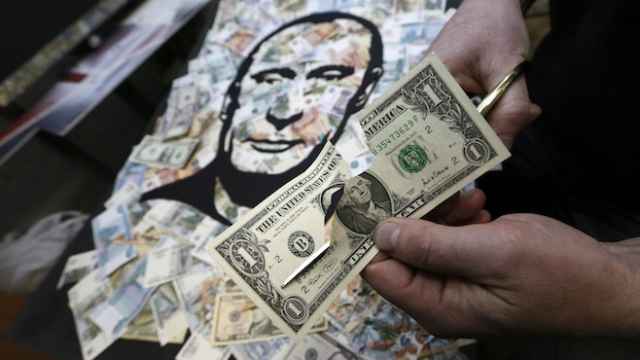The Russian ruble weakened on Monday morning, dragged down by falling oil prices and fears of new European Union sanctions against Russia.
At 0955 GMT the ruble was down 0.3 percent against the U.S. dollar at 47.31, and 0.1 percent weaker at 59.10 against the euro.
The price of oil, Russia's major export, softened on Monday following a rally on Friday, with Brent down over $1 at just over $78 a barrel after the International Energy Agency on Friday said that it expected downward pressure on oil prices to continue.
Investors are also wary ahead of a meeting of EU foreign ministers on Monday to discuss a possible extension of sanctions imposed over Russia's actions in Ukraine.
EU officials have said new sanctions against Russia are not likely at this stage, however, although they may be imposed against more Russia-backed separatists in eastern Ukraine.
President Vladimir Putin came under heavy criticism at a G20 summit over the weekend, where Western leaders accused Putin of continuing to destabilize Ukraine in violation of a September peace agreement.
The Russian Central Bank is making a debut auction of up to $10 billion in 1-year dollar repos later on Monday, as part of a new scheme to provide foreign currency loans to banks.
Success for the scheme may support the ruble by providing banks with an alternative to buying dollars on the forex market. Previous auctions of one-week and 28-day repos saw only slight demand from banks, deterred by the short tenors available.
Separately, the Ministry of Finance said on Monday it had placed $2.1 billion in a 28-day deposit auction, compared with a limit of $3 billion, in another step by the Russian authorities to meet heavy demand for foreign currency.
Despite the falling oil price and weakening ruble, Russian stock indexes were slightly stronger on Monday.
The dollar-denominated RTS index was up 0.1 percent at 1,004 points, while the ruble-based MICEX was up 0.5 percent at 1,508 points.
Rossiysky Kapital analyst Anastasia Sosnova said in note that the market is likely to tread water ahead of the EU's decision on new sanctions, but that a strengthening of sanctions against Russia is not planned.
A Message from The Moscow Times:
Dear readers,
We are facing unprecedented challenges. Russia's Prosecutor General's Office has designated The Moscow Times as an "undesirable" organization, criminalizing our work and putting our staff at risk of prosecution. This follows our earlier unjust labeling as a "foreign agent."
These actions are direct attempts to silence independent journalism in Russia. The authorities claim our work "discredits the decisions of the Russian leadership." We see things differently: we strive to provide accurate, unbiased reporting on Russia.
We, the journalists of The Moscow Times, refuse to be silenced. But to continue our work, we need your help.
Your support, no matter how small, makes a world of difference. If you can, please support us monthly starting from just $2. It's quick to set up, and every contribution makes a significant impact.
By supporting The Moscow Times, you're defending open, independent journalism in the face of repression. Thank you for standing with us.
Remind me later.






